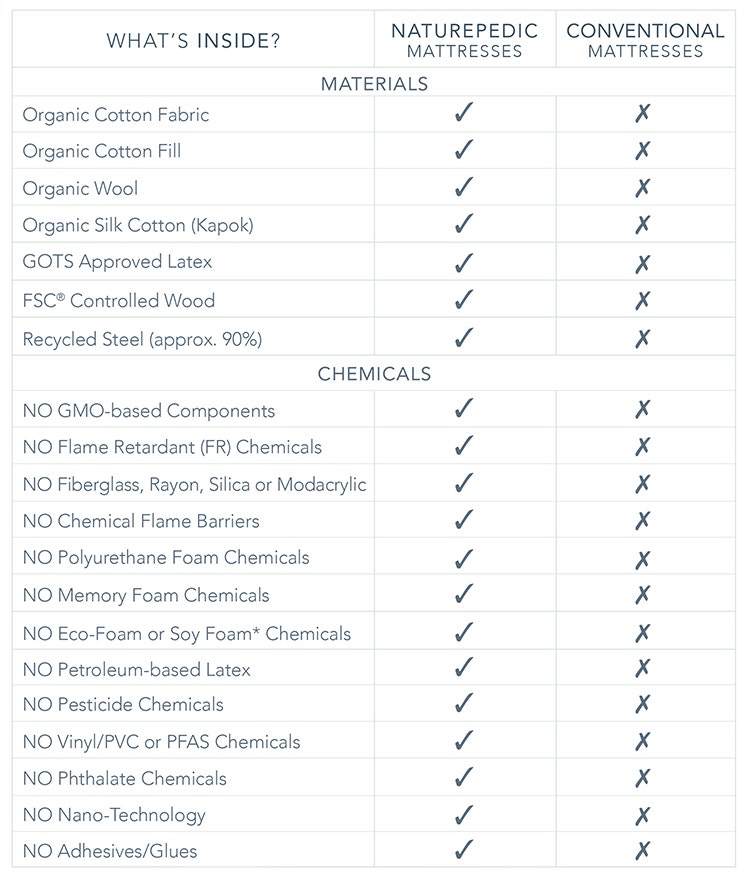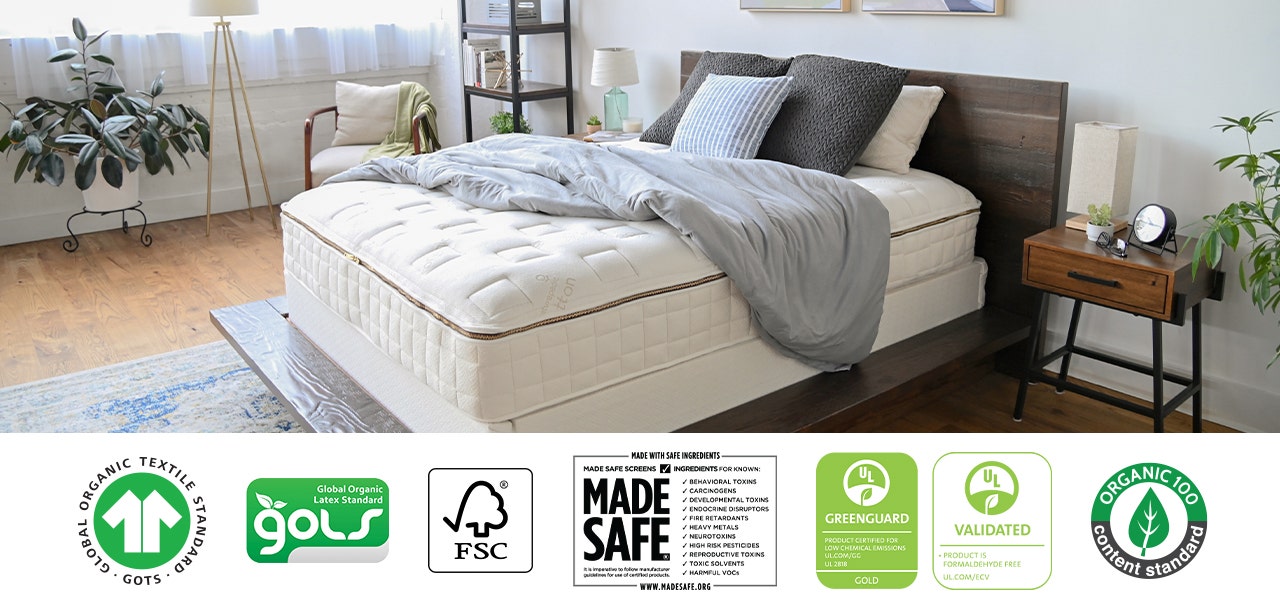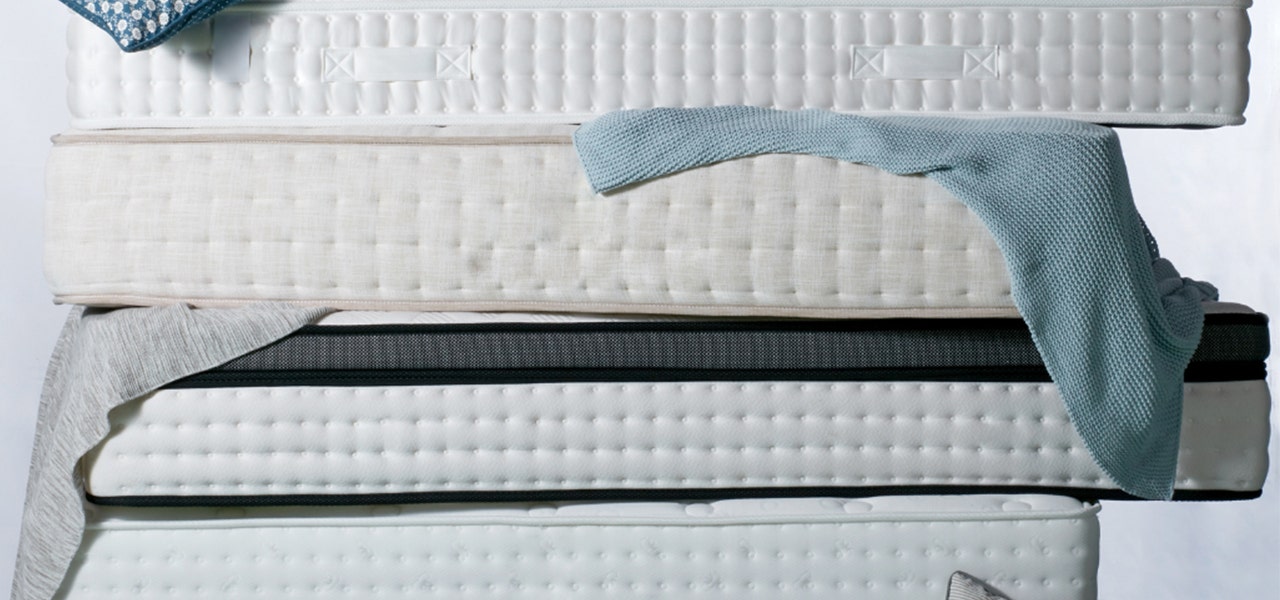When we started Naturepedic in 2003, the term "organic mattress" didn't mean much to most people. Organic was for fruits and veggies, right?
Luckily, organic mattresses are no longer a niche item and many brands now offer them. But, shopper beware: Not all organic mattresses are created equal.
Today, we're talking to our founder and technical director, Board Certified Environmental Engineer Barry Cik, to give you some insight.
What are organic mattresses made from?
Organic mattresses incorporate organic fibers, approved latex and other approved, reasonably non-toxic materials. This includes certified organic cotton fabrics, certified organic cotton fill, certified organic wool, steel coils and latex (made from rubber sap) approved by GOTS for organic mattresses. Other materials may be allowed in minor amounts and/or for accessory uses. In some cases, other materials may be allowed in major amounts as well. For example, steel coils are actually a majority (certainly by weight) of the whole organic mattress.
Virtually all items allowed but that are not organic fibers are mostly all considered “accessories” in the GOTS system. So, again, steel is an accessory. And, for example, our polyethylene waterproofing is also an accessory. (There are some things that are not organic fibers and are not accessories. But, for the most part, this holds true.)


More importantly, what aren’t organic mattresses made from?
A major characteristic of most organic mattresses is that they do not contain polyurethane foam. The Global Organic Textile Standard (GOTS), the leading standard for organic mattresses, explicitly states that to qualify for GOTS certification, mattresses and textiles cannot contain polyurethane foams, including all versions of memory foam, soy foams, eco foams and plant-based foams (which, yes, are actually just forms of polyurethane foam).
Organic mattresses do not contain numerous other materials and chemicals, but this can depend on technical specifics. It’s a long list that includes:
- Many latex foams
- Flame retardants
- Endocrine disruptors
- Pesticides
- Phthalates
- Formaldehyde
- Genetically modified organisms (GMOs)
Why does the word "organic" cause confusion for mattress shoppers?
The word “organic” is, unfortunately, not defined or regulated by the U.S. government for mattresses. There are no laws that regulate the marketing, materials or construction of organic mattresses, which is one reason why so many questionable practices exist.
That being said, the Federal Trade Commission (FTC) may soon issue guidance on the use of the term “organic” for consumer products like mattresses – it’s currently working on updating its “Environmental Claims Green Guides,” and will be addressing the issue at some point.
Right now, the USDA definition of the term “organic” only applies to agricultural products, for example, organic apples and organic apples that have been processed into organic apple juice. The same is not true for “organic cotton” once it is processed chemically and otherwise into clothing or a mattress. That’s why voluntary certification standards, like GOTS, are critical in determining what can and cannot be considered an organic mattress.
Okay, so how does organic mattress certification work?
According to the USDA National Organic Program, an organic mattress must be certified to the Global Organic Textile Standard. GOTS is a voluntary certification program that categorizes each mattress component into one of two categories:
- Fibers, such as organic cotton fabrics, organic cotton fill and organic wool
- Accessories, or structural and functional components, such as approved latex, steel coils and other items deemed to be non-toxic
To get a product certified organic, manufacturers must engage with a GOTS-approved certifier to ensure material and component compliance. This certifier inspects the mattress factory and reviews the various GOTS transaction certificates provided by suppliers to verify the chain of custody.
Are there other certifications consumers should look for?


GOTS is the strictest organic standard there is for mattresses. That being said, there are other useful organic and non-toxic standards to look out for. These include:
- GOLS and FSC®, which certify latex and are required for GOTS certification
- MADE SAFE®, which reviews components in a mattress and then compares that list against chemicals considered to be toxic or questionable
- OCS, which certifies individual components, not finished mattresses
- GREENGUARD®, which tests products for common emissions, such as volatile organic chemicals (VOCs) and formaldehyde
Head over to our certifications page for a full list of certifications that we adhere to and recommend you look for when shopping.
Do organic mattresses eliminate all chemicals?
It’s essentially impossible to remove all chemicals from mattresses. There are approximately 85,000 chemicals used in industrial processes and found in consumer products. The GOTS organic standard certifies mattresses that do not include the vast majority of questionable chemicals.
To that end, organic mattresses eliminate questionable chemicals and materials – anything known or suspected to cause harm to human health. Commonly used materials and chemicals in typical conventional mattresses that fall into this “questionable” category include:
- Polyurethane foam chemicals
- Flame retardants
- Formaldehyde
- Pesticides
- Glues/adhesives
- Vinyl/phthalates
- Perfluorinated compounds (including PFAS)
- GMOs
And many more.
Can a company make both organic and non-organic mattresses?


Unfortunately, yes. Many organic mattress manufacturers that have been certified to make organic mattresses also make mattresses (sometimes under different brand names) with toxic and questionable chemicals.
These companies don’t believe in the organic/non-toxic movement or in the products they’re selling – they just want to profit off of mindful consumers’ good intentions. And for that, they’re much more likely to cut corners in their manufacturing and practice deceptive marketing practices than brands that truly care about offering safer, healthier products.
There are just a few organic mattress manufacturers that do not make any mattresses with GOTS prohibited materials, and Naturepedic is one of them.
What advice do you have for organic mattress shoppers?
Certifications are everything. If you take one thing away from this blog, it should be that: it’s not organic unless it’s certified organic. And when it comes to organic certifications, GOTS is the best of the best.
Stay tuned for a deep dive with Barry into Baby and Kids mattresses – coming soon! In the meantime, you can check out Barry’s recent articles in Furniture World or read our previous Q&A, 20 Questions with Naturepedic Founder to Kickstart Our 20th Year.
 BABY
BABY  KIDS
KIDS  ADULT
ADULT  LEARN
LEARN  STORES
STORES 